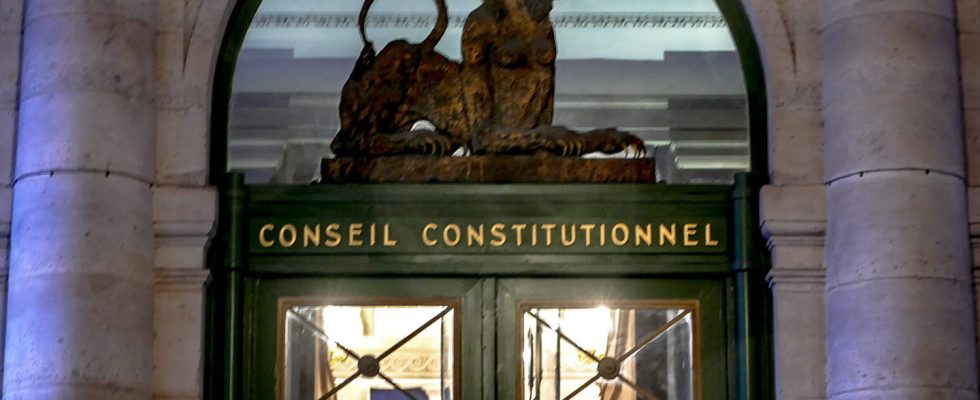The Wise Men deliver their verdict this Thursday on the immigration law. Half of the provisions of the text have been submitted to the Constitutional Council, which should censor part of the project.
One month after the chaotic adoption of the immigration law last December, to say the least, the Constitutional Council, through the voice of its nine Sages of rue Montpensier, must deliver its verdict on Thursday January 25, 2024, around 4 p.m. Unusually, and not the least, the presidential camp, which had to make major concessions to the right to pass its law in a joint joint committee, expects as much as the left opposition, if not more, that the The institution corrects the situation.
Lacking an absolute majority in the National Assembly, but also due to rebels from the left wing of the presidential camp, “the desire to reach a political agreement and a vote prevailed over the legal one”, concedes a framework of the majority Parisian. From the President of the Republic, who himself referred the matter to the Council, to the President of the Assembly via the former Prime Minister Élisabeth Borne, all agree on the fact that the voted text contains unconstitutional provisions. But the executive hopes to implement a revised law and refer disputes to the Constitutional Council: “If the law is censored, it is no longer the government that will be criticized, whereas it is the government that should bear this political responsibility.” , assures, in this sense, the constitutionalist Jean-Philippe Derosier to the AFP.
In total, three referrals to the Constitutional Council were filed on December 26. There are no less than forty provisions that the Sages have had to sift through in recent weeks. They are essentially criticized for: the fact that they are contrary to the Constitution or their “legislative rider” character, in other words the fact that certain articles are considered out of place in relation to the overall nature of the text.
These four major measures whose fate will be scrutinized
Among the provisions which raise questions, four major measures could be skipped, points out in particular Humanity. First: migration quotas. In the event of promulgation of the immigration law, this measure will require Parliament to vote for three years on the number of foreigners who will have the right to settle in France, with a significant risk of a breakdown in equality. Thus, with equivalent files, certain foreigners could be sent back simply because the quota threshold has been reached.
Another measure: the hardening of the law of the soil. While until now this right was automatic, its recognition must now be requested between 16 and 18 years of age. This provision could be seen as a legislative rider, the measure being more about nationality reform than immigration. Let us note in passing that no less than 27 measures are considered legislative riders, and therefore which a priori have nothing to do with the immigration law, recalls the HuffPost. Among them, mastery of French by the spouse or those who require “sufficiently stable and continuous relationships” (family reunification).
Third major measure, the decision on toughening family reunification is also eagerly awaited. The measure provides that the applicant can claim family reunification from a duration of stay in France of 24 months and no longer 18, and on condition of having “stable, regular and sufficient” resources, among other things.
The Constitutional Council could choose to revoke it, judging that it is contrary to the fundamental principles which protect family life. Finally, a particularly sensitive measure whose fate will also be scrutinized is that concerning social benefits. With the immigration law as it was voted by the joint joint committee, a foreigner in a regular situation and without employment will not be able to receive social benefits (APL, family allowances, etc.) before being able to prove at least five years of presence on the territory. The period will be halved (2.5 years) for working foreigners. The Sages could this time invoke the card of “break of equality” or “national preference”, which would then pose a problem since France must, according to its Constitution, ensure equality between its citizens. before the law, without distinction of origin, religion or race.
Towards partial censorship?
Speaking to HuffPost, Sacha Houlié, Renaissance deputy and president of the Law Commission, suggests that the Constitutional Council could censor around “thirty” measures. Remember that the text has a little more than 80 provisions. Likewise, while some left-wing deputies still hope for total censorship of the immigration law, the site recalls that the Sages have only taken this decision in the past twenty times out of… nearly 400 laws examined. If there must be censorship, it is more likely to be partial, the legislative riders having a good chance of being excluded.
In any case, even if the Constitutional Council removes the provisions closest to the RN program, Marine Le Pen’s party will not appear weakened. “Censorship or not, the RN has already won. Because the majority, extended to the Republicans, has agreed to play on its territory and with its own rules. In the eyes of public opinion and experts alike, it is the ideas of the RN which have been included in the law. Even if censorship would make the text less harsh, and therefore more acceptable to the presidential camp, the damage is done”, analyzes for The Huff Mathieu Souquière, essayist and associate expert with the Jean Jaurès Foundation
